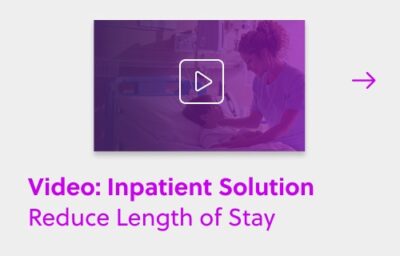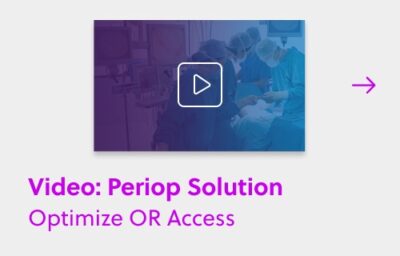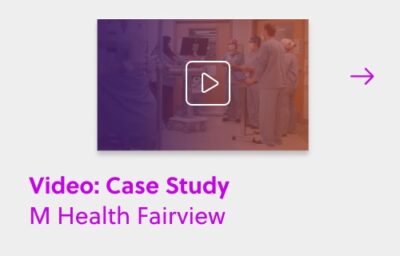New Advancements to Inpatient Solution Decrease Excess Days, Reduce Burden on Frontline Teams and Create Capacity for Covid-19 and Beyond
MOUNTAIN VIEW, Calif., Dec. 1, 2020 — Qventus, the leader in real-time operations for healthcare, today introduced new innovations within its Inpatient Solution that enable leaders to streamline patient flow and optimize the utilization of critical hospital resources. The new set of capabilities — including Discharge Autopilot, Performance Improvement Automation and ICU Stepdown Solution — significantly advance the company’s industry-leading inpatient offering to decrease excess days, reduce the burden on frontline teams and create ICU capacity. These capabilities enable health systems to address key challenges resulting from the pandemic — including deteriorating margins, burned-out staff and constrained ICU resources — while simultaneously implementing operational best practices to help thrive in the post-pandemic world.
The Qventus Inpatient Solution streamlines and standardizes care progression, resulting in up to 0.8 day decreases in length of stay. Integrating with electronic health record (EHR) systems, it uses artificial intelligence (AI) to identify potential issues days in advance of discharge, behavioral science techniques to orchestrate processes and collaborate with ancillaries, and statistical engines to manage accountability and drive continuous improvement across teams.
The new innovations within the Qventus Inpatient Solution include:
- Discharge Autopilot. Discharge Autopilot introduces new process automation capabilities, auto-populating estimated date of discharge (EDD) and discharge disposition predictions into the Inpatient Solution’s multidisciplinary rounding product if the information does not already exist. This automation is particularly valuable for reducing hospital costs, since early discharge planning is strongly associated with decreases in excess days. Additionally, it improves the accuracy of EDDs early in the patient stay, since the Qventus machine learning (ML) predictions are twice as accurate as those typically captured by care teams. Finally, it removes manual steps from the multidisciplinary rounding discussions, reducing variability and decreasing the burden on frontline teams.
- Performance Improvement Automation. Performance Improvement (PI) Automation provides powerful new capabilities that enable leadership teams to better and more easily manage adherence to discharge planning processes. It uses advanced statistical process analytics to distill key discharge planning best practices into a new Discharge QScore — a single, proprietary process metric that reflects when and how accurately care teams are planning for patient discharge. In addition to measuring adherence to best practices, analysis of tens of thousands of patient records shows that Discharge QScore is highly correlated with excess day reductions.
- With PI Automation and Discharge QScore, leadership teams can measure best practice adherence, automatically detect when processes slip and reinforce behaviors over time to drive sustained length of stay reductions.
- ICU Stepdown Solution. The new ICU Stepdown Solution helps critical care units identify stepdown opportunities earlier and free up ICU capacity. Featuring an ML-driven Transferability Score which recommends patients for early stepdown, it identifies 25% more patients for stepdown than identified by care teams alone. With real time “nudges” and dashboards, the solution automatically surfaces potential stepdowns, orchestrates actions for teams to resolve predicted bed shortages and creates visibility into real time stepdown progression.
- In the era of Covid-19, when ICUs have become a key bottleneck resource, optimizing stepdown processes represents a significant opportunity for hospitals to create new “effective” capacity. One-third of ICU patients are ready for stepdown eight to 12 hours before a transfer order is placed, creating a significant opportunity for hospitals to free up beds, reduce upstream holds in the ED and OR, and lower costs.
“Covid-19 has intensified many operational challenges within healthcare, making real-time operations more important and valuable than ever before,” said Mudit Garg, co-founder and CEO of Qventus. “These new innovations enable health systems to create even more value from their EHR and Qventus deployments, providing levels of automation and insight into hospital operations that have never before been possible. We’re grateful that by advancing our mission — to transform the way healthcare operates — we’re helping health system partners not only manage through the pandemic, but also prepare for the new normal.”
About Qventus
Qventus is the leader in real-time operations for hospitals and health systems. The Qventus platform integrates with and extends EHRs by applying AI and behavioral science to: identify and predict operational issues before they occur, orchestrate actions among frontline teams and ancillaries, and manage accountability to drive continuous improvement. Qventus works with 70+ leading organizations across the country, including Dignity Health, M Health Fairview, Mercy, and NewYork-Presbyterian. These partners are achieving transformative results across inpatient, ED, perioperative and system operations settings, including 0.3 to 0.8 day reductions in length of stay and the elimination of thousands of excess days. For more, visit qventus.com.


